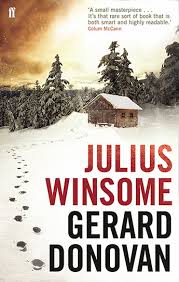Recently I was fortunate enough to participate in a workshop at Avid Reader by author Krissy Kneen all about how to read like a writer and write like a reader. One of the texts Krissy set for us to examine was the novella Julius Winsome (Faber and Faber 2007) by Gerard Donovan. This slim book, written in simple but evocative language, is a tale of grief and loss, revenge, isolation and loneliness, and the simmering legacy of violence; it is a contemplation on life and on death. It is a transportive narrative of human flaws and failings, and of the desperate search for connection and love.
In the snowy terrain of the Maine mountains, Julius Winsome lives an isolated life in the cabin he once shared with his father, long dead, and his faithful rescue dog, Hobbes. Every wall of the cabin is lined with books. Julius Winsome is a lonely figure; he had only one brief relationship with a woman named Claire some years previously, and it was Claire who took him to the pound and persuaded him to rescue the puppy. But now that liaison too is over, and it is only Julius and his books and Hobbes.
The book opens with the line: ‘I think I heard the shot.’ Some unknown person, for reasons unfathomable to Julius Winsome, has shot and killed Hobbes. The grief and distress of losing his only companion fills his heart with revenge, and the book covers the short period of a few days afterwards when Julius is desperate to find out – and to punish – the person who shot his dog.
Julius Winsome is one of those characters in literature – like Olive Kitteridge or Eleanor Oliphant – who will leave an indelible mark on your mind. His thoughts, his behaviour, his compromises, his way of making peace with his actions and with the deeds of others, are all interrogated in an intense and intimate way. The violence – when it appears – is shocking; the ending is surprising and unexpected; questions of moral authority and ethical boundaries are entwined in this resonant and wise novel. I would classify this book as quite ‘literary’ but also very easy to read. It would be perfect for book clubs who are looking for a short read that nevertheless packs a punch and is brimming with discussion points.

